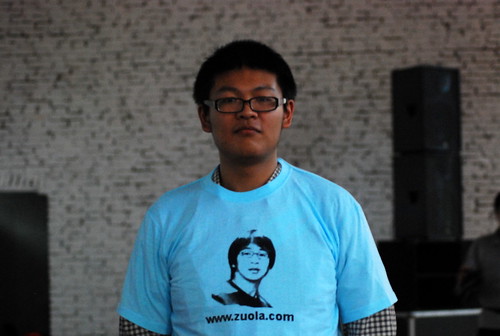Special Note: This is the perfect opportunity for Tibet internet activists like Oxblood Ruffin and concerned netizens everywhere to engage Chinese people on the Internet in discussions about what is going on. As I previously outlined in a primer to engage Chinese people, these are channels where one can register a free account and launch dialogues with Chinese individuals about Tibet. Many of the people I’ve included below are neither kneejerk nationalists or xenophobes, and some of them know some English too. It wouldn’t hurt to try. You can respond by clicking on the username link at the beginning of each tweet, sign up, and talk back.
To be updated periodically. Translations are rough and quick, suggestions helpful. (thanks to Feng37)
From Fanfou member 新闻触角:
发生在西藏拉萨的骚乱依然持续。有证据表明,这是达赖“藏独”集团暗中指示和操纵的破坏活动。根据最新获得 的电视画面显示,拉萨市浓烟滚滚火光冲天。不法之徒挥舞榔头、斧头砸毁店铺、银行、政府机关的玻璃和门窗,推翻或砸毁停放在路边的汽车,燃烧轮胎,人群中 有青年、学生和身穿宗教服饰的喇嘛。
[Events in Lhasa continue as before. There is evidence indicating the Dalai Lama “Tibetan Independence” group in secret has directed and controlled this sabotage. According to the latest TV broadcasts, a thick cloud of smoke is visible above Lhasa. Lawlessness is rampant, shops and banks have been trashed, government windows are smashed (or is it shuttered?), cars overturned, tires burning, there are crowds of youth, students and lamas.]
拉萨星期五发生大规模藏人抗议活动,公安部门下午一点左右开始戒严,所有居民不准外出,在拉萨街头已经看见军队车辆穿梭,坦克装甲车进驻群众示威的八角广场,政府派军队包围了拉萨最大的3所寺庙,封锁现场。新华社英文网站报道证实,警察使用了催泪弹,并且朝天鸣枪。
[On Friday there were large scale Tibetan protests in Lhasa, in the afternoon Public Security began to restrict the area, residents told not to go out, in the streets already see military troop transports, tanks and armored cars approach the demonstrators in Bajiao Square, government troops surround Lhasa’s three largest temples, seal off the area. Xinhua English reports confirm police used tear gas, in addition to warning shots being fired.]
带着鲑鱼旅行 我的妈呀,西藏出乱子了。内地新闻单位机构出入必须佩带证件。
[Mama mia, Tibet has gone nuts. Domestic news organizations must have proper credentials to go in and out.]
Wayne 三月十五日,西藏发生了自八九年以来最为严重的骚乱。
[March 15h, Tibet incident most serious incident since ’89]
阿企 @远骋 坚决反对藏独,但要给与藏民适当自治权
[@ YuanCheng (distance runner?) I firmly oppose Tibetan Independence, but want to grant Tibetan’s appropriate autonomous rights]
IQ小子 大多有关西藏的贴吧都被关闭了。
[For the most part Tibet related webpages are all closed.]
三儿 西藏又暴乱了 真的假的
[Tibet rioted again true or false?]
katly58 @shippo7 嗨 真不知道西藏哪几头家伙一直在作祟 好想灭了他们啊
[Sigh, really don’t know why these Tibetan guys constantly make trouble, best exterminate them]
shippo7 腾讯QQ封锁了有关西藏骚乱的信息,有相关关键字的信息对方收不到
[Tencent QQ shutdown related to Tibet incident messages, can’t receive messages with related keywords]
浪子 [中共] 你能对西藏仁慈点吗? 2008-03-15 22:51
[Chinese Communist Party] Can you show Tibet a little mercy?
Shadow 西藏真的暴乱鸟,明天就不让说这个话题鸟…… 2008-03-15 20:26
[If Tibet is really rebelling, tomorrow we won’t be allowed to discuss this topic… …]
痛苦的信仰 向自由、民主的西藏斗志们致敬//Less talk and More work 2008-03-15 23:33
[For freedom, Democratic Tibet will fight on// Less talk and More work]
geuro 西藏是不是也成敏感词了 2008-03-16 11:08
[Is Tibet becoming a sensitive topic or not?]
oland 问了德国朋友问题,她怎么看西藏铁路,她说中国政府很聪明,既方便汉族人去西藏玩,又可以更简单的剥削藏族人。如果中国政府能有哪怕一点的人权,尊重他们的宗教,事情可能也许不会那么遭。我的回答是,法国对非洲的政策从来不是以自由民主和平为指导思想的,其他国家的范围可能小一些,但是做法有过之 2008-03-16 11:22
[Asked a German friend how she views the Tibetan railway, she said the Chinese government is really brilliant, they’ve made it convenient for Han to visit Tibet, while at the same time can exploit the Tibetan people. If the Chinese government had granted just one human right, and respected their religion, maybe things wouldn’t have turned out this way. My answer is, French policy in Africa was never based on democratic peace, other countries occasionally have(?), but they’ve done it this way before]
璐人甲 美国一朋友问我西藏为什么要暴动 2008-03-16 11:23
[American friend asked me why Tibet is rebelling]
oland 不平衡这个是事实,世界上到处都有不平衡,没人能解决这个问题,如果一个藏族的当地贵族家庭在北京没有收到贵宾待遇而在做些工艺品的小买卖,如果一个汉族的农民在西藏可以把持当地经济命脉,我倒是觉得这个世界有点奇怪的让人炫目。我不知道你归纳出来的,藏人到汉族地区只能做些手工艺品小买卖是一种 2008-03-16 11:33
[Inequality is a fact of life, there’s inequality all over the world, no one can solve this kind of problem. If a Tibetan family in Beijing sells handicrafts instead of getting treated like royalty, or if a Han peasant in Tibet dominates the local economy, I think this indicates the world is sometimes strangely confusing. I don’t see how you reach the conclusion that the only opportunity for Tibetans in Han areas is to sell handicrafts.]
兽兽 @oland 你问了一大圈英国、美国、印度人、IMF、World Bank,你干嘛不问问,由什么人控制经济命脉,西藏当地人怎么想。当地的妇女、僧侣、下层民众怎么想? 2008-03-16 11:35
[@oland You keep talking about England, America, Indians, the IMF, World Bank, why don’t you ask who controls the economy, how Tibetan locals feel about it, or what women, monks, the lower classes, think about it]
LeafDuo 百度百科的 西 藏 词条被锁定,wiki 的 西藏 词条被半保护 2008-03-16 21:05
[Baidu Baike has locked out the term “Tibet” wiki has partially blocked the term]
GONG youtube访问不能,我想看台山交警事件,西藏事件,入联公投事件的视频啊… 2008-03-16 19:32
[Can’t visit youtube, I wanted to see videos of the Taiwan traffic incident, Tibet incident, the UN referendum (in Taiwan), arggghh]
Gerald 西藏、青海、甘肃等省区的主要官员,目前都在北京出席全国人大会议,他们能否准确掌握藏民示威抗议的诉求、骚乱的形成,将直接影响胡锦涛的最后决策。 2008-03-16 18:40
[Tibet, Qinghai, Gansu provincial leaders, presently all in Beijing attending the NPC meeting, they can’t adequately deal with the Tibetan protests, growing disturbances, will directly influence Hu Jintao’s final decisions]
浪子 历史上的西藏从来和中国都是暧昧着忽近忽远。也没有哪个民族,哪个个体和一个国家的关系就不可分割。还是那句老话:个人的命运个人决定,同样,一个民族的命运由那个民族的大多数来决定 2008-03-16
[Historically Tibet and China have always had a rocky relationship. No ethnic group or individual is inseperable from nations. Hence the old saying: one’s fate is one’s own choice, just as a peoples fate is decided by the majority of the people]







